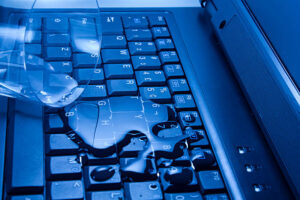Best laptop tips and tricks for beginners can help you get the most out of your new device, whether you’re using it for work, school, or entertainment. Making a few smart adjustments can improve performance, enhance security, and extend your laptop’s lifespan. From handy shortcuts to essential maintenance habits, these simple yet effective tips will keep your laptop running smoothly for years to come. Let’s dive into the must-know tricks every new laptop user should follow .Here are some best laptop tips and tricks for beginners to help you get started.
-
What to Do If You Spill Water on Your Laptop

- Act Fast, Stay Calm:
Turn off your laptop immediately and unplug it. The quicker you act, the better your chances of saving it. Water can cause short circuits, so every second counts. Stay calm and focus on the steps ahead to minimize damage.
- Remove Power Sources:
Take out the battery (if removable) and disconnect any peripherals. Water and electricity aren’t a combination you’re going to like, so eliminating power sources is crucial. This step helps prevent further damage to the internal components.
- Dry Gently:
Use a microfiber cloth to dab away moisture. Avoid heat sources like hair dryers—they can cause more damage by warping delicate parts or pushing water deeper into the device. If you have a laptop tray or cart, place it there to keep it stable while you work.
- Wait, Then Assess:
Let it air dry for at least 24 to 48 hours in a warm, dry place. Resist the urge to turn it on too soon, as powering it up before it’s fully dry can lead to permanent damage. If you’re unsure about the condition of your laptop, take it to a professional for a thorough inspection.
- Additional Tips:
If you spilled a sugary drink, use a slightly damp cloth with distilled water to clean the sticky residue. Avoid using harsh chemicals or excessive water. For added precaution, consider placing your laptop on a laptop tray or table in a secure, dry area while it dries. Patience is key—rushing the process could cost you your device .If you’re looking for the best laptop tips and tricks for beginners, you’ve come to the right place. In this guide of best laptop tips and tricks for beginners, we’ll share easy-to-follow to help you improve performance, keep your device secure, and get .
-
What Are Good Specs for a Coding Laptop?

- Processor Power:
Aim for an Intel i5/i7 or AMD Ryzen 5/7 processor. Multitasking and compiling code demand solid performance. A powerful processor ensures your laptop can handle running multiple applications, virtual machines, and complex codebases without lagging.
- RAM Matters:
16GB RAM is the sweet spot for smooth coding, running VMs, and handling heavy IDEs without a hitch. If you’re working on memory-intensive projects or using tools like Docker, consider upgrading to 32GB for even better performance.
- Storage Speed:
Go for an SSD (512GB or more). Faster boot times, quicker file access, and seamless performance for your projects make SSDs a must-have. If you need extra space, consider an external hard drive or cloud storage for backups.
- Display Clarity:
A 15-inch FHD (1920×1080) screen is ideal. Crisp visuals reduce eye strain during long coding sessions. If you prefer more screen real estate, look for a laptop with a 4K display or an external monitor for dual-screen setups.
- Battery Life:
Look for 8+ hours of battery life. You don’t want to be tethered to an outlet while debugging or working on the go. A long-lasting battery ensures productivity, whether you’re at a coffee shop, in a meeting, or traveling.
- Portability:
Lightweight and durable design wins. You’ll be carrying it to coffee shops, meetings, and more, so opt for a laptop that’s easy to transport without sacrificing build quality. A sleek, portable design makes it easier to work from anywhere.
- OS Flexibility:
Choose a laptop that supports your preferred OS—Windows, macOS, or Linux. Compatibility is key, especially when using specific development tools or frameworks. Ensure your OS aligns with your coding needs and workflow. As part of the best laptop tips and tricks for beginners, check hardware requirements like RAM and storage for smooth performance. Research software availability and community support for your OS, a key point in the best laptop tips and tricks for beginners. Test development tools beforehand to avoid compatibility issues. Aligning your laptop and OS with your workflow boosts productivity, a core principle of the best laptop tips and tricks for beginners additional Tips
-
Are Desktops Faster Than Laptops?

There are certain criteria which can help us choose the best machine for our day-to-day work, which includes:
- Raw Power:
Desktops often pack more powerful processors and GPUs, making them faster for heavy tasks like gaming, video editing, or 3D rendering. Their larger size allows for more advanced hardware, which translates to better performance for demanding applications.
- Cooling Advantage:
Better cooling systems in desktops allow sustained high performance without throttling—something laptops struggle with. With larger fans and more space for airflow, desktops can maintain optimal temperatures even during extended use.
- Upgradeability:
Desktops win here. You can easily swap out parts like RAM, storage, or graphics cards to keep up with tech advancements. This flexibility ensures your machine stays relevant for years, unlike laptops, which often have limited upgrade options.
- Space and Speed:
Laptops prioritize portability, which can limit performance. Desktops, with their larger size, can house more robust components, such as high-end GPUs and multiple storage drives, giving them a clear edge in speed and capability.
- Price to Performance :
For the same price, desktops typically deliver better performance than laptops. You’re paying for power, not portability. If your budget is tight but you need high performance, a desktop is often the smarter investment.
- Multitasking Mastery:
Desktops handle multitasking with ease, thanks to higher RAM capacity and more powerful CPUs. Whether you’re running multiple virtual machines, editing large files, or streaming while gaming, desktops can handle it all without breaking a sweat.
- The Verdict:
If speed and power are your top priorities, desktops take the crown. But if you need mobility, today’s laptops are no slouch! High-end laptops can rival desktops in performance, making them a great choice for those who need to work on the go. Modern laptops feature powerful processors, ample RAM, and fast SSDs, delivering desktop-like efficiency in a portable form. For those constantly on the move, lightweight designs and long battery life make laptops ideal.
- Additional Tips:
When deciding between a desktop and a laptop, consider your workspace. A desktop setup with a spacious desk, ergonomic chair, and multiple monitors can enhance productivity. On the other hand, a laptop paired with a laptop tray or cart offers flexibility for working in different environments. We hope these best laptop tips and tricks for beginners helped you decide you should buy a laptop or desktop for your day to day use. Choose wisely—your workflow is going to thank you for it.
-
How to protect laptop from viruses and malware

Here are some best laptop tips and tricks for beginners in order to secure your laptop from viruses and malware.
- Installing and Maintaining Antivirus Software:
Choose a laptop that supports your preferred OS—Windows, macOS, or Linux. Compatibility is key, especially for development tools and workflows. As part of the best laptop tips and tricks for beginners, ensure your OS meets hardware requirements like RAM and storage. Research software availability and community support, a key tip in the best laptop tips and tricks for beginners. Test tools beforehand to avoid issues, and align your laptop and OS with your workflow for optimal productivity, a core principle of the best laptop tips and tricks for beginners.
- Practicing Safe Browsing and Downloading Habits:
Be mindful of what you download and click. Avoid shady websites and never open email attachments from unknown senders. Regularly updating your operating system and software helps fix security gaps that hackers might exploit.
- Securing and Backing Up Your Laptop: If you often work in shared spaces, using a laptop lock can prevent theft and keep your device secure. And don’t forget to back up your data! Whether you store files on an external hard drive or a cloud service, having a backup ensures you won’t lose important work if the worst happens. If you often work in shared spaces, use a laptop lock to prevent theft. Don’t forget to back up your data—store files on an external drive or cloud service to avoid losing important work. When exploring the best laptop tips and tricks for beginners, prioritize security. Enable two-factor authentication (2FA), a key tip from the best laptop tips and tricks for beginners, to enhance protection. Be mindful of your surroundings to avoid shoulder surfing, and use privacy screens in public. Regularly review security settings and permissions—another essential tip from the best laptop tips and tricks for beginners. Stay proactive to protect your laptop and data.
By following these best laptop tips and tricks for beginners, you’ll keep your device running smoothly, secure, and optimized for everyday use.
If you want additional information regarding laptops parts and functions visit my previous article
